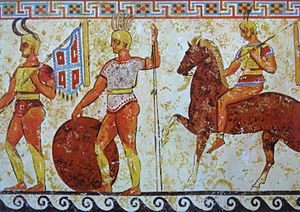Chapter four
This is my next book writing bulletin (just in case you are interested). I am hiding away for a few days in order to get on with chapter four. This is the chapter -- if we were to use the usual teleological narrative (which I am of course rejecting!) -- in which we see Rome emerging from the shadowy "monarchy", launching the "free Republic" and somewhere near the end of the chapter being mistress of most of Italy we're talking fifth to fourth/early third centuries BCE very roughly).
I say "somewhere near the end" of the chapter because I haven't quite decided where to break between chaps four and five. The point about chapter breaks is that they have to seem to be purposive, at least not fall at some merely arbitrary spot. Yet, at the same time, I am trying not to make it look as if each chapter in the first half of the book simply represents one more stage in Rome's relentless rise to power: the "now she's conquered Italy, and soon she'll be on to the rest of the Med" approach.
To put this a bit more generally, it is actually harder than you might imagine, when writing about this period of Roman history, to avoid the teleology that I so breezily just dismissed. The stuff just seems to write itself if you go along with the Rome's grand plan line....
BUT, but, but . . .
One thing that certain is that Rome didnt have any grand conquest plan in the fifth century BCE. It is just possible that there was some kind of ideology of world domination by the end of the first century BCE, but even that depends on taking poetic conceits very literally, and having a very narrow view of "the world". At the beginning of the free Republic (c 500 BCE) it is just mad to imagine that anyone in Rome was planning to take over Italy. For a start they didn't have a conception of what "Italy" was (and indeed how they envisaged their geographical configuration with their neighbours is itself puzzling and interesting). So the sense that you often get of Roman campaign HQ in which they are moving the salt cellars around the tablecloth to represent the enemy location, 2nd world war style, is quite off. (Though I can tell you that the number of modern writers who talk about Roman "foreign policy" at this period -- which is almost as bad -- in staggering.)
Yet the fact remains that within about 200 years they had conquered what we call Italy, and some kind of explanation is needed. If it cant be because of a grand plan, then it cant be because they were "naturally belligerent" either. No people are "naturally" more warlike than others. They might become more warlike, then "naturalise" it. But that is quite another matter.
The explanation must lie (and I am hardly the first person to say this) somewhere in Rome's fundamental dealings with her neighbours and those she happened to beat. In fact the point is that we shouldnt be thinking of Rome conceiving her position in Italy geographically, as if territorial expansion was the aim. We should be thinking of the Romans striking a series of (over dominating arrangements with) nighbouring people (ie people and communities, not land is the issue here). And it is in those relationships, and the permanence of them, that the reason for Rome's success ("success" that is, if you're not a Samnite) lie.
Even so, we have to reckon that the whole thing was a lot more improvised, a lot more thought-up on the hoof than the usual scemes often imply. I just dont imagine that he Roman in the fifth century sat around discussing what "treaty conditions" they could impose on the Volsci...no, they presumably were tryig to work out how to work out how they were going to co-exist with/take advantage of the Volsci. And again, that's very different.
Put simply, I want to argue that early Republican Rome is all a bit smaller scale, unformalised, messier than grand narratives like to imagine
Mary Beard's Blog
- Mary Beard's profile
- 4110 followers




